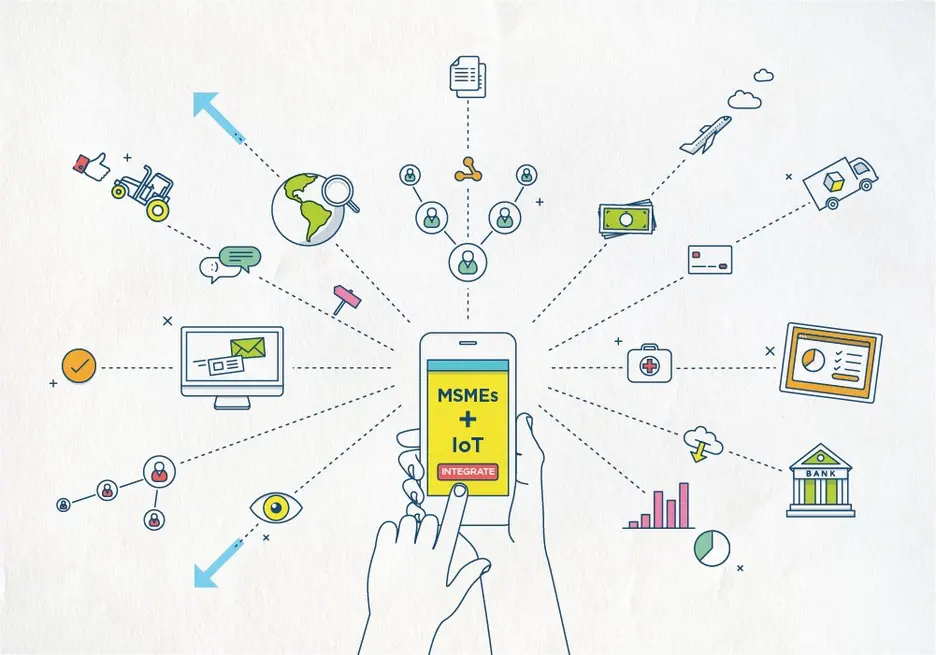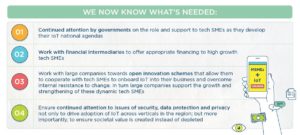4 Ways to Propel Tech SMEs and Internet of Things in Our Region

On MSME Day we are reminded of the important role MSMEs (Micro-, Small and Medium-sized Enterprises) play in our economies and in sustainable development. In Latin America and the Caribbean, MSMEs account for 99 percent of business and 67 percent of employment.
As we seek to support the development of the Internet of Things (IoT) sector in the region, it will be important to not only work towards avoiding a digital divide. We need to ensure that ‘traditional’ SMEs (Small and Medium-sized Enterprises) can integrate digital solutions in their business models or can be better served through digital solutions; but it will be key to also recognize the important role and potential of tech SMEs to accelerate digitalization and have long-lasting impact in our region’s economies.
One way to do this is allowing IoT solutions to transform the way we do business. Through IoT, companies are gaining better customer insights, automating and boosting efficiencies in their processes, and improving their products and services. By leveraging the power of connectivity, smart machines and real-time analytics of vast amounts of data, IoT is accurately and rapidly informing business decisions and driving business value.

Tech SMEs and a role to play
Tech Small and Medium Enterprises (SMEs) have a significant role to play in the IoT value chain by designing, integrating and adapting IoT solutions that respond to the realities, ecosystem and needs of the region. This became clear during an IoT Summit hosted in early June by IDB Invest in Mexico, during GSMA’s Mobile 360 Latin America event. The Summit brought together companies from the region as well as Korean companies sharing the experience in a more mature IoT market.
Participants to the summit included well established companies like G7net which through its Giotrace brand offers IoT applications to improve traceability, measurement and monitoring. For instance, in transportation, it offers fleet management solutions, to monitor in real time and optimize vehicle maintenance, with enriched information of each connected vehicle. ITA which through its IoT platform Synermetrix offers solutions to monitor and manage remote assets across verticals, as well as IoT biometric devices to mitigate fraud. Other participants included early stage tech companies such as Flatbox with solutions in agriculture to monitor environmental conditions and bring climate insurance to farmers in partnership with local banks.
Discussions with several participant companies surfaced common elements: They are poised for growth and represent and investment opportunity–offering innovative solutions that are disrupting operations across sectors, and with a strong potential to reach scale. They are often already partnering with big telecommunication companies in the region. They are bringing innovation, adaptation to rapid change and flexibility attributes to their engagement with large companies across verticals to encourage, design and implement IoT solutions. In alignment with SDG 9 (“build resilient infrastructure, promote inclusive and sustainable industrialization and foster innovation”), they are bringing B2B collaboration, and contributing to innovation across industries through solutions that are creating both business and societal value.
We now know what’s needed:
- Continued attention by governments on the role and support to tech SMEs as they develop their IoT national agendas
- Work with financial intermediaries to offer appropriate financing to high growth tech SMEs
- Work with large companies towards open innovation schemes that allow them to cooperate with tech SMEs to onboard IoT into their business and overcome internal resistance to change. In turn large companies support the growth and strengthening of these dynamic tech SMEs
- Ensure continued attention to issues of security, data protection and privacy not only to drive adoption of IoT across verticals in the region; but more importantly, to ensure societal value is created instead of depleted
A recent study by Bain and Company estimates that worldwide, the IoT market (including hardware, software, systems integration, and data and telecoms services) will grow to $520 billion by 2021. Fast growth in the IoT market is expected in the region, particularly in South America, where the market is projected to reach $19,407.1 million by 2023. By nature, IoT enables and requires inter-connectivity and cooperation.
Arguably, the real power of IoT lies in its cross-sectoral application‒where IoT solutions connect devices across verticals, and give way to an era of smart agriculture, smart healthcare, smart transportation, smart manufacturing as well, as smart cities. These are among the many other ways we can work to integrate MSMEs into a digital solutions world.■
LIKE WHAT YOU JUST READ?
Subscribe to our mailing list to stay informed on the latest IDB Invest news, blog posts, upcoming events, and to learn more about specific areas of interest.
Subscribe



